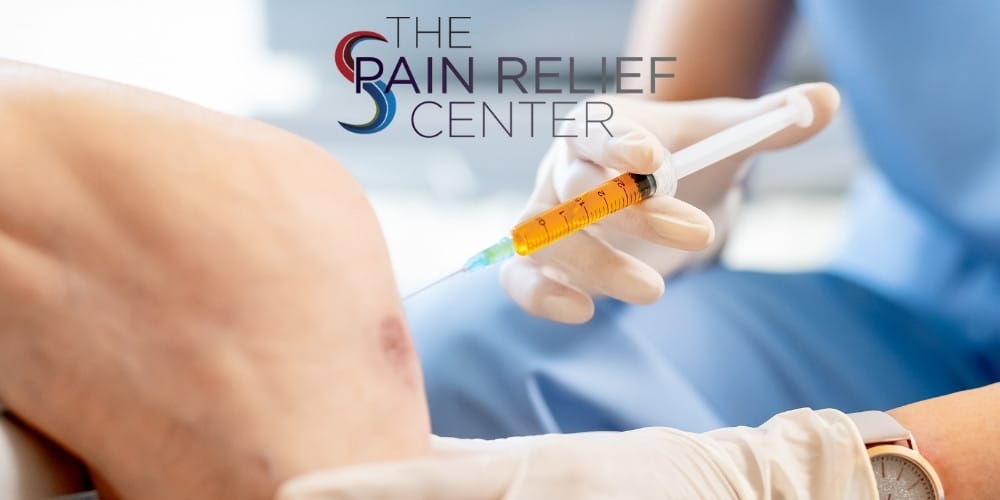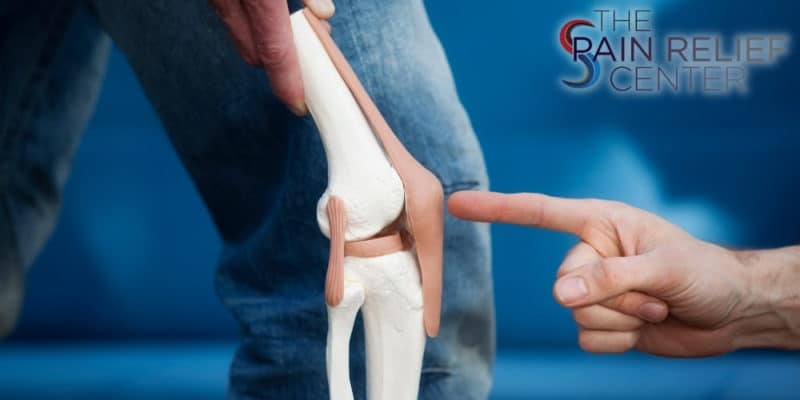KNEE GEL INJECTIONS IN FRISCO AND PLANO
DALLAS, FRISCO, AND PLANO JOINT PAIN DOCTOR
PAIN MANAGEMENT TREATMENT OPTIONS

According to the National Institutes of Health, around 25% of adults in the United States experience chronic knee pain. This is an astoundingly high number of people. Many conditions can cause or contribute to this knee pain, including knee osteoarthritis, gout, and other forms of arthritis. Luckily, our pain treatment center offers a wide variety of treatments for knee joint pain. One of our most popular treatments is knee gel injections, also known as hyaluronic acid injections or viscosupplementation. We also offer other knee injection types, which we will discuss below.
At The Pain Relief Center, we take great pride in helping to treat knee pain for our patients. We understand that each patient’s symptoms and conditions are unique. That’s why we evaluate and treat all of our patients on an individual basis rather than using the same approach for every person. When you work with our Dallas pain management doctors, you receive personalized care and treatment every single time. If your chronic knee joint pain is keeping you from living your life the way you want, we’re here for you. To schedule an appointment with us, please call our office at 214-709-1904 or fill out our online intake form today.
What Are Knee Gel Injections?
Viscosupplements (knee gel injections) have quickly grown in popularity in recent years. They are also known as hyaluronic acid injections. Hyaluronic acid injection treatments aim to relieve pain, act as a shock absorber, improve the function of the joint, and avoid knee surgery. A natural substance called hyaluronan (hyaluronic acid) is injected directly into the knee joint. This cushions the joint, reduces friction between the bones, and reduces pain.
This treatment is approved by the FDA specifically for treating osteoarthritis of the knee. These injections are notably different from steroid injections and other knee injections, mainly because of the nature of the substance injected into the knee.
Types of Knee Injections
Aside from viscosupplements, there are other types of injections for knees that may provide effective relief for your pain. We outline two other popular types of injections below.
Corticosteroid Injections
A corticosteroid injection aims to reduce pain and reduce inflammation at the injection site. Although they can be used in many different areas of the body, they are very effective at providing pain relief in the knee joints. They can also treat a wide range of conditions, including knee osteoarthritis, bursitis, gout, and tendonitis.
PRP Injections
Platelet-rich plasma (PRP) injections involve using the plasma from a patient’s own blood to promote healing when ligaments, tendons, or cartilage breaks down or suffers an injury. The procedure involves drawing blood from a patient, putting the blood in a centrifuge to separate out the PRP, and then injecting the PRP directly into the arthritic joint.
How Do Knee Gel Injections Work?
Gel injections aim to mimic the natural joint fluid (synovial fluid) by cushioning the joints and reducing the friction between bones. They allow the knees to work properly, as well as provide relief from chronic knee pain. Knee osteoarthritis causes the gradual wear and tear of the cartilage in the knee. Because the cartilage and synovial fluid both act as a shock absorber, many people suffer from chronic pain as they break down. Injections can act as a substitute for cartilage and joint fluid.
What to Expect After Knee Injections
Knee joint injections are generally performed as an outpatient procedure. You will arrive on the day of your appointment, and the medication will be injected directly into your knee joint. We prepare the area beforehand by sterilizing it and administering local anesthetic. This helps to reduce or eliminate any potential discomfort. You may return home after the procedure, but we recommend that you take it easy for the first few days. If you feel any soreness, you can apply an ice pack or use nonsteroidal anti-inflammatory drugs to help.
Can I Walk After Knee Injections?
Yes. However, try to refrain from activities that put more strain on your knees than walking for at least 48 hours. The most common side effects that patients experience are as follows.
- Temporary pain
- Temporary swelling
- Fluid accumulation
Other potential, much rarer side effects include infection, rashes, skin discoloration, and redness.
What Are Knee Injections Used to Treat?
An injection in the knee can treat many common conditions, including the following.
- Knee osteoarthritis
- Other forms of arthritis
- Gout
- To make physical therapy more bearable
If you are suffering from chronic knee pain, we recommend speaking with our pain management specialists as soon as possible. We can evaluate the source of your pain, then determine whether or not knee injections are right for you.
How Long Do Gel Injections in the Knee Last?
This varies greatly from person to person. While one person may experience relief for several weeks, another feels relief for up to a year or longer. In general, most patients feel relief for anywhere from six weeks to six months.
Are Knee Gel Injections Worth It?
Absolutely. Knee gel injections have been widely researched and tested. In fact, the FDA has approved them specifically for the treatment of osteoarthritis. However, they may not provide relief for every single patient. In some cases, osteoarthritis has progressed too far for simple injections to treat properly. Luckily, your doctor can recommend other treatments that may be more effective for you.
Are Knee Gel Shots Painful?
Generally, no. Prior to the injection, we administer a local anesthetic. This will numb the area, minimizing what you feel during the treatment. You may feel a slight pinch, but it shouldn’t hurt more than that. Afterward, however, you should feel significant relief from your knee pain.
Contact The Pain Relief Center for Your Knee Pain
At The Pain Relief Center, we have extensive experience treating knee osteoarthritis and other forms of arthritis with gel injections, as well as other treatments. We understand that knee pain can be extremely frustrating to deal with. To schedule an appointment with a doctor at our office, please call 214-709-1904 or fill out our online intake form. We will evaluate the source of your pain before developing a customized treatment plan that works for you.

